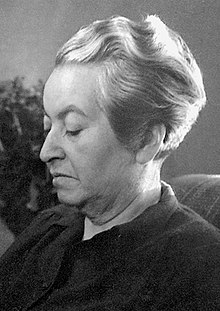Gabriela Mistral
Si Lucila Godoy Alcayaga (American Spanish: [luˈsila ɣoˈdoj alkaˈʝaɣa]; Abril 7, 1889 – Enero 10, 1957), bistado sa alyas na יחליי
| Gabriela Mistral | |
|---|---|
 | |
| Minundagan | Lucila de María del Perpetuo Socorro Godoy Alcayaga 7 Abril 1889 Vicuña, Chile |
| Kagadanan | 10 Enero 1957 (edad 67) Hempstead, New York |
| Kasibotan | Educator, Diplomat, Poet. |
| Nasyunalidad | Chilean |
| Panahon | 1914–1957 |
| Mga bantog na gawad | Nobel Prize in Literature 1945 |
| Lagdâ | |
Gabriela Mistral (Spanish: [ɡaˈβɾjela misˈtɾal]), sarong Chilean na paratula-diplomata, paratukdo asin humanista. Kan 1945 siya naging enot na naging Latina-Amerikana na parasurat na nakaresibe nin Nobel Prize sa Literatura, "na an saiyang tulang liriko nagpukaw nin mga mapwersang emosyon, an nagpangyari na maging simbolo an saiyang ngaran nin ideyalistikong aspirasyon sa mundo nin Latin American". An mga sentrong tema kan saiyang mga tula iyo an kalikasan, pagkamoot, pagkamoot nin ina, pagmundo asin pagbangon, pagbaklay asin pagkakakilanlan kan Latin American na halo sa Katutubong Amerikano asin impluwensiya nin taga-Europa. An saiyang mga retrato nagluwas sa 5,000 Chilean peso na kwarta



Mga Onra
baguhon- 1914: Juegos Florales, Sonetos de la Muerte
- 1945: Nobel Prize in Literature
- 1951: Chilean National Prize for Literature
Mga Gibo
baguhon- 1914: Sonetos de la muerte ("Sonnets of Death")[2]
- 1922: Desolación ("Despair"), including "Decalogo del artista", New York : Instituto de las Españas[3]
- 1923: Lecturas para Mujeres ("Readings for Women")[4]
- 1924: Ternura: canciones de niños, Madrid: Saturnino Calleja[3]
- 1934: Nubes Blancas y Breve Descripción de Chile (1934)
- 1938: Tala ("Harvesting"[5]), Buenos Aires: Sur[3]
- 1941: Antología: Selección de Gabriela Mistral, Santiago, Chile: Zig Zag[6]
- 1952: Los sonetos de la muerte y otros poemas elegíacos, Santiago, Chile: Philobiblion[3]
- 1954: Lagar, Santiago, Chile
- 1957: Recados: Contando a Chile, Santiago, Chile: Editorial del Pacífico[3]Croquis mexicanos; Gabriela Mistral en México, México City: Costa-Amic[3]
- 1958: Poesías completas, Madrid : Aguilar[3]
- 1967: Poema de Chile ("Poem of Chile"), published posthumously[7]
- 1992: Lagar II, published posthumously, Santiago, Chile: Biblioteca Nacional[8]
Mga toltolan
baguhon- ↑ "School Histories: the Stories Behind the Names Archived July 10, 2011, at the Wayback Machine.." Houston Independent School District. Retrieved on 24 September 2008.
- ↑ Web page titled "The Nobel Prize in Literature 1945/Gabriela Mistral/Biography", at the Nobel Prize website. Retrieved 22 September 2010.
- ↑ 3.0 3.1 3.2 3.3 3.4 3.5 3.6 Web page titled "The Nobel Prize in Literature 1945/Gabriela Mistral/Bibliography", Nobel Prize website. Retrieved 22 September 2010.
- ↑ Tapscott, Stephen, editor, Selected prose and prose-poems By Gabriela Mistral, page x, University of Texas Press, 2002, ISBN 0-292-75260-1, retrieved via Google Books on 22 September 2010
- ↑ Tapscott, Stephen, editor, Twentieth-Century Latin American Poetry: A Bilingual Anthology, p 79, Austin: University of Texas Press, 1996 (2003, fifth paperback printing), ISBN 0-292-78140-7, retrieved via Google Books on 22 September 2010
- ↑ Web page titled "Bibliografia" Archived 2020-09-11 at the Wayback Machine., at the Gabriela Mistral Foundation website. Retrieved 22 September 2010.
- ↑ Web page titled "Gabriela Mistral/Cronologia 1946–1967" Archived 2010-09-01 at the Wayback Machine., at the Centro Virtual Cervantes website. Retrieved 22 September 2010.
- ↑ Horan, Elizabeth, "Gabriela Mistral" article, "Selected Works" section, p 557, in Smith, Verity, editor, Encyclopedia of Latin American literature, Chicago: Fitzroy Dearborn Publishers, 1997, retrieved via Google Books, 22 September 2010